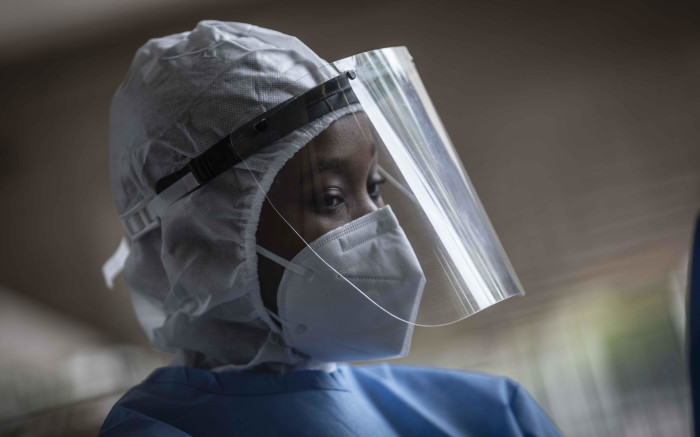[ad_1]
Africa’s most infected country may have passed the peak of a deadly second wave of coronavirus, but an increase in patient numbers in recent weeks has worn nurses out.
A health worker at Nasrec Field Hospital in Johannesburg. Photo: Abigail Javier / Eyewitness News
JOHANNESBURG – Nthabeleng, a 28-year-old nurse on the front line of the COVID pandemic in South Africa, is exhausted and scared.
Every day, she begins her shift haunted by fear of contracting coronavirus and dying, leaving behind a five-year-old girl. She ends her numb with fatigue, but the fear remains.
Every week a “colleague dies” somewhere, said Nthabeleng, who works in a rural clinic in northern Limpopo province.
That morning, two nurses had died at another clinic in the same province, she said.
“We’re also in the death queue – we’re just waiting for our day,” she said, her voice shrouded in discouragement.
Africa’s most infected country may have passed the peak of a deadly second wave of coronavirus, but an increase in patient numbers in recent weeks has worn nurses out.
At least 1.46 million infections have been recorded in South Africa, which represents 41% of the continent’s total cases. Among them, 45,000 died.
A new, more contagious variant of the virus has fueled the spread, and the pressure on hospitals is the worst in living memory in the country.
Compared to most African countries, South Africa’s healthcare system is well-off, but workers say they have struggled to cope.
Grueling 12-hour shifts, soothing panicked patients, and switching between infected and uninfected patients are all part of Nthabeleng’s routine at the small clinic where only three nurses work.
“It’s like a supermarket approach – you do everything,” she said over the phone, nervously recounting her daily routine.
The fear of transmitting the virus between patients and of catching it on her own runs deep.
Earlier this week, South Africa took delivery of its first coronavirus vaccines – one million doses of the Oxford-AstraZeneca formula, which arrived from India.
But it won’t be until mid-February before the country’s vaccination campaign begins, and it will be several months before the population of 58 million is protected.
“ CLANDESTINE ” DEATH ACCOUNT
In the meantime, “the situation is very bad,” said a 27-year-old nurse. “The rate of positive tests among nurses is high.”
“Some get better and some die,” he said. “I recently lost a colleague who worked at a nearby clinic.”
More than 35,100 medical workers contracted the virus in the South African public sector in October last year, according to Health Minister Zweli Mkhize, of whom more than 400 have died.
New figures are not available and the unions are in any case skeptical.
Khaya Xaba, spokesperson for the Union of National Education and Health Sector Workers (Nehawu), called the number of infected and dying workers “illegal”.
Vacancies left by deceased nurses are not being filled quickly, adding to the workload of those who survived, according to another union.
“Those who died have not been replaced and the unemployed nurses remain very unemployed,” Lerato Mthunzi, president of the Indaba young nurses’ union, told AFP.
The government says it appointed more than 14,232 additional nurses between March and October last year.
Despite exhaustion, many nurses vow to stay on the front lines.
Nthabeleng, meanwhile, says she moved from her home and to a nursing hostel to protect her young child and retired grandmother from infection.
Download the Eyewitness News app on your iOS or Android device.
[ad_2]
Source link
